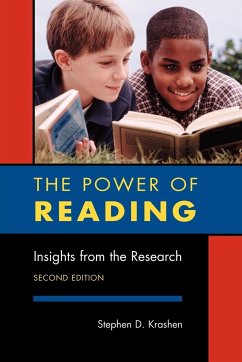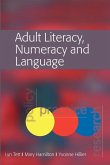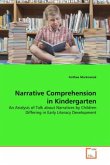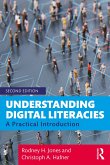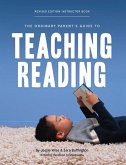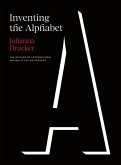- Broschiertes Buch
- Merkliste
- Auf die Merkliste
- Bewerten Bewerten
- Teilen
- Produkt teilen
- Produkterinnerung
- Produkterinnerung
Continuing the case for free voluntary reading set out in the book's 1993 first edition, this new, updated, and much-looked-for second edition explores new research done on the topic in the last ten years as well as looking anew at some of the original research reviewed.
Andere Kunden interessierten sich auch für
![Adult Literacy, Numeracy and Language: Policy, Practice and Research Adult Literacy, Numeracy and Language: Policy, Practice and Research]() Lyn TettAdult Literacy, Numeracy and Language: Policy, Practice and Research39,99 €
Lyn TettAdult Literacy, Numeracy and Language: Policy, Practice and Research39,99 €![Narrative Comprehension in Kindergarten Narrative Comprehension in Kindergarten]() Anthea MarkowiakNarrative Comprehension in Kindergarten44,99 €
Anthea MarkowiakNarrative Comprehension in Kindergarten44,99 €![Understanding Digital Literacies Understanding Digital Literacies]() Rodney H. JonesUnderstanding Digital Literacies39,99 €
Rodney H. JonesUnderstanding Digital Literacies39,99 €![The Ordinary Parent's Guide to Teaching Reading, Revised Edition Instructor Book The Ordinary Parent's Guide to Teaching Reading, Revised Edition Instructor Book]() Jessie WiseThe Ordinary Parent's Guide to Teaching Reading, Revised Edition Instructor Book33,99 €
Jessie WiseThe Ordinary Parent's Guide to Teaching Reading, Revised Edition Instructor Book33,99 €![Talk for Writing in Secondary Schools: How to Achieve Effective Reading, Writing and Communication Across the Curriculum (Revised Edition) Talk for Writing in Secondary Schools: How to Achieve Effective Reading, Writing and Communication Across the Curriculum (Revised Edition)]() Julia StrongTalk for Writing in Secondary Schools: How to Achieve Effective Reading, Writing and Communication Across the Curriculum (Revised Edition)55,99 €
Julia StrongTalk for Writing in Secondary Schools: How to Achieve Effective Reading, Writing and Communication Across the Curriculum (Revised Edition)55,99 €![Inventing the Alphabet Inventing the Alphabet]() Johanna DruckerInventing the Alphabet32,99 €
Johanna DruckerInventing the Alphabet32,99 €![Literary Reading, Cognition and Emotion Literary Reading, Cognition and Emotion]() Michael BurkeLiterary Reading, Cognition and Emotion50,99 €
Michael BurkeLiterary Reading, Cognition and Emotion50,99 €-
-
-
Continuing the case for free voluntary reading set out in the book's 1993 first edition, this new, updated, and much-looked-for second edition explores new research done on the topic in the last ten years as well as looking anew at some of the original research reviewed.
Hinweis: Dieser Artikel kann nur an eine deutsche Lieferadresse ausgeliefert werden.
Hinweis: Dieser Artikel kann nur an eine deutsche Lieferadresse ausgeliefert werden.
Produktdetails
- Produktdetails
- Verlag: Libraries Unlimited
- 2nd ed.
- Seitenzahl: 216
- Erscheinungstermin: 1. August 2004
- Englisch
- Abmessung: 234mm x 156mm x 12mm
- Gewicht: 338g
- ISBN-13: 9781591581697
- ISBN-10: 1591581699
- Artikelnr.: 13941621
- Herstellerkennzeichnung
- Libri GmbH
- Europaallee 1
- 36244 Bad Hersfeld
- gpsr@libri.de
- Verlag: Libraries Unlimited
- 2nd ed.
- Seitenzahl: 216
- Erscheinungstermin: 1. August 2004
- Englisch
- Abmessung: 234mm x 156mm x 12mm
- Gewicht: 338g
- ISBN-13: 9781591581697
- ISBN-10: 1591581699
- Artikelnr.: 13941621
- Herstellerkennzeichnung
- Libri GmbH
- Europaallee 1
- 36244 Bad Hersfeld
- gpsr@libri.de
STEPHEN KRASHEN is Professor, School of Education, University of Southern California, Los Angeles. An Honoree of the National Association for Bilingual Education, his research specialty is language acquisition.
ContentsIntroduction ix1.The Research1The Evidence for FVR1In-School Free
Reading Programs1Reported Free Voluntary Reading8Reported Free Reading in a
Second Language9The Author Recognition Test11Read and Test
Studies13Summary17The Alternative to Free Reading: Direct Instruction18The
Complexity Argument18Competence without Instruction20The Effect of
Instruction25Other Benefits of Reading28The Pleasure of Reading28Reading
and Cognitive Development35Good Thinkers Read More36Reading and Writing
Apprehension36Conclusion37An Interpretation37Notes40vContents2.The
Cure57Access57More Access at Home Results in More Reading57Better Classroom
Libraries Result in More Reading58Better School Libraries Result in More
Reading58Access to Public Libraries Results in More Reading60Comfort and
Quiet63Libraries63Children Get Their Books from Libraries64Better Libraries
Result in Better Reading65Poverty and Access to Books68What About
School?70Libraries and Second Language Acquirers74Money for Libraries: Who
Is Paying Now?75Reading Aloud77Reading Experience81Home Run
Books82Models84Providing Time to Read85Direct Encouragement86Other
Factors89Light Reading: Comic Books91A Brief History93Comic Books and
Language Development97Comic Texts97Experiments with Comic Book
Reading101Comics as a Conduit103The Case for Comics109Light Reading: The
Teen Romance110Light Reading: The Power of Magazines113Is Light Reading:
Enough?114viContentsDo Rewards Work?116What Does the Research
Say?117Reading Management Programs119Notes1223.Other Issues and
Conclusions129The Limits of Reading129Writing132Writing Style Comes from
Reading132More Writing Does Not Mean Better Writing134What Writing
Does137The Effect of Television139Does More Television Mean Less
Reading?140The Language of Television142Television and Language
Development144Television: A Summary145Second Language
Acquirers146Conclusions149Notes152References157Researcher Index189Subject
Index197vii
Reading Programs1Reported Free Voluntary Reading8Reported Free Reading in a
Second Language9The Author Recognition Test11Read and Test
Studies13Summary17The Alternative to Free Reading: Direct Instruction18The
Complexity Argument18Competence without Instruction20The Effect of
Instruction25Other Benefits of Reading28The Pleasure of Reading28Reading
and Cognitive Development35Good Thinkers Read More36Reading and Writing
Apprehension36Conclusion37An Interpretation37Notes40vContents2.The
Cure57Access57More Access at Home Results in More Reading57Better Classroom
Libraries Result in More Reading58Better School Libraries Result in More
Reading58Access to Public Libraries Results in More Reading60Comfort and
Quiet63Libraries63Children Get Their Books from Libraries64Better Libraries
Result in Better Reading65Poverty and Access to Books68What About
School?70Libraries and Second Language Acquirers74Money for Libraries: Who
Is Paying Now?75Reading Aloud77Reading Experience81Home Run
Books82Models84Providing Time to Read85Direct Encouragement86Other
Factors89Light Reading: Comic Books91A Brief History93Comic Books and
Language Development97Comic Texts97Experiments with Comic Book
Reading101Comics as a Conduit103The Case for Comics109Light Reading: The
Teen Romance110Light Reading: The Power of Magazines113Is Light Reading:
Enough?114viContentsDo Rewards Work?116What Does the Research
Say?117Reading Management Programs119Notes1223.Other Issues and
Conclusions129The Limits of Reading129Writing132Writing Style Comes from
Reading132More Writing Does Not Mean Better Writing134What Writing
Does137The Effect of Television139Does More Television Mean Less
Reading?140The Language of Television142Television and Language
Development144Television: A Summary145Second Language
Acquirers146Conclusions149Notes152References157Researcher Index189Subject
Index197vii
ContentsIntroduction ix1.The Research1The Evidence for FVR1In-School Free
Reading Programs1Reported Free Voluntary Reading8Reported Free Reading in a
Second Language9The Author Recognition Test11Read and Test
Studies13Summary17The Alternative to Free Reading: Direct Instruction18The
Complexity Argument18Competence without Instruction20The Effect of
Instruction25Other Benefits of Reading28The Pleasure of Reading28Reading
and Cognitive Development35Good Thinkers Read More36Reading and Writing
Apprehension36Conclusion37An Interpretation37Notes40vContents2.The
Cure57Access57More Access at Home Results in More Reading57Better Classroom
Libraries Result in More Reading58Better School Libraries Result in More
Reading58Access to Public Libraries Results in More Reading60Comfort and
Quiet63Libraries63Children Get Their Books from Libraries64Better Libraries
Result in Better Reading65Poverty and Access to Books68What About
School?70Libraries and Second Language Acquirers74Money for Libraries: Who
Is Paying Now?75Reading Aloud77Reading Experience81Home Run
Books82Models84Providing Time to Read85Direct Encouragement86Other
Factors89Light Reading: Comic Books91A Brief History93Comic Books and
Language Development97Comic Texts97Experiments with Comic Book
Reading101Comics as a Conduit103The Case for Comics109Light Reading: The
Teen Romance110Light Reading: The Power of Magazines113Is Light Reading:
Enough?114viContentsDo Rewards Work?116What Does the Research
Say?117Reading Management Programs119Notes1223.Other Issues and
Conclusions129The Limits of Reading129Writing132Writing Style Comes from
Reading132More Writing Does Not Mean Better Writing134What Writing
Does137The Effect of Television139Does More Television Mean Less
Reading?140The Language of Television142Television and Language
Development144Television: A Summary145Second Language
Acquirers146Conclusions149Notes152References157Researcher Index189Subject
Index197vii
Reading Programs1Reported Free Voluntary Reading8Reported Free Reading in a
Second Language9The Author Recognition Test11Read and Test
Studies13Summary17The Alternative to Free Reading: Direct Instruction18The
Complexity Argument18Competence without Instruction20The Effect of
Instruction25Other Benefits of Reading28The Pleasure of Reading28Reading
and Cognitive Development35Good Thinkers Read More36Reading and Writing
Apprehension36Conclusion37An Interpretation37Notes40vContents2.The
Cure57Access57More Access at Home Results in More Reading57Better Classroom
Libraries Result in More Reading58Better School Libraries Result in More
Reading58Access to Public Libraries Results in More Reading60Comfort and
Quiet63Libraries63Children Get Their Books from Libraries64Better Libraries
Result in Better Reading65Poverty and Access to Books68What About
School?70Libraries and Second Language Acquirers74Money for Libraries: Who
Is Paying Now?75Reading Aloud77Reading Experience81Home Run
Books82Models84Providing Time to Read85Direct Encouragement86Other
Factors89Light Reading: Comic Books91A Brief History93Comic Books and
Language Development97Comic Texts97Experiments with Comic Book
Reading101Comics as a Conduit103The Case for Comics109Light Reading: The
Teen Romance110Light Reading: The Power of Magazines113Is Light Reading:
Enough?114viContentsDo Rewards Work?116What Does the Research
Say?117Reading Management Programs119Notes1223.Other Issues and
Conclusions129The Limits of Reading129Writing132Writing Style Comes from
Reading132More Writing Does Not Mean Better Writing134What Writing
Does137The Effect of Television139Does More Television Mean Less
Reading?140The Language of Television142Television and Language
Development144Television: A Summary145Second Language
Acquirers146Conclusions149Notes152References157Researcher Index189Subject
Index197vii

